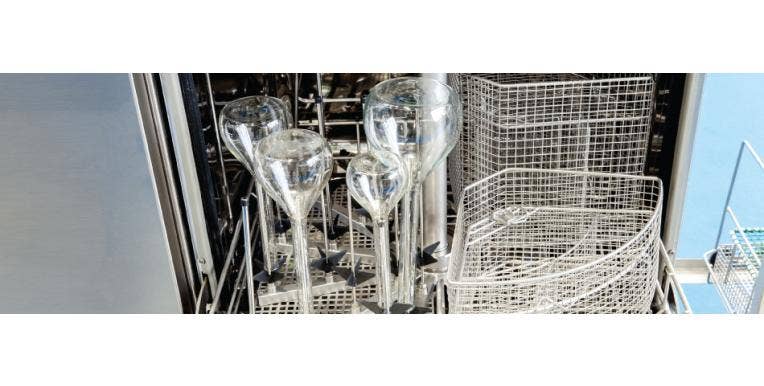Difference Between a Lab Glasswasher & a Domestic Dishwasher
Although a domestic washer is a much lower cost than a laboratory glassware washer, it is not always suited for use in the commercial setting as it may not have the advanced features needed for laboratory work. Here are some key differences between domestic dishwashers and laboratory glassware washers:
Pump and rinsing systems
Domestic washers are not suitable to be used in a high-end laboratory as they use a single pump. This means that clean and dirty water passes through the same pump and the incoming clean water is travelling through the same space the dirty water has just left, creating cross-contamination. In contrast, specialised laboratory washers are equipped with dual pumps and stringent purification systems to ensure that only contaminant-free, non-recycled water is used in the cleaning process.
Racks and Injectors
The irregular shape of laboratory glassware presents a problem when using domestic dishwashers in the laboratory. Domestic washers are designed to wash household dishes such as glasses, ceramic cups, plates, knives, forks and spoons and they may not be designed to accommodate the Narrow-necked glassware and utensils found in a lab such as Erlenmeyer flasks, graduated cylinders, and many other laboratory products. Laboratory washers have modular racks suited to beakers, flasks and pipettes and also have the capability to directly inject water and/or detergent through the spindle into the glassware. Certain glassware washers can even pump hot air through the same injectors during drying cycles to remove moisture from the inside of the glassware.
Temperature
Domestic washers typically heat water to between 55ºC to 75ºC. This temperature range is too low to adequately sanitise reusable laboratory equipment. A Laboratory glassware washer will heat water up to about 93ºC.
Construction
Domestic washers are not designed to stand up to solvents and chemicals commonly used in a laboratory. A laboratory washer is designed and built with the laboratory in mind. It is typically more commercial, structurally tough and resistant to corrosives. Laboratory washers are typically wider and larger than domestic washers due to their additional water purification systems.




